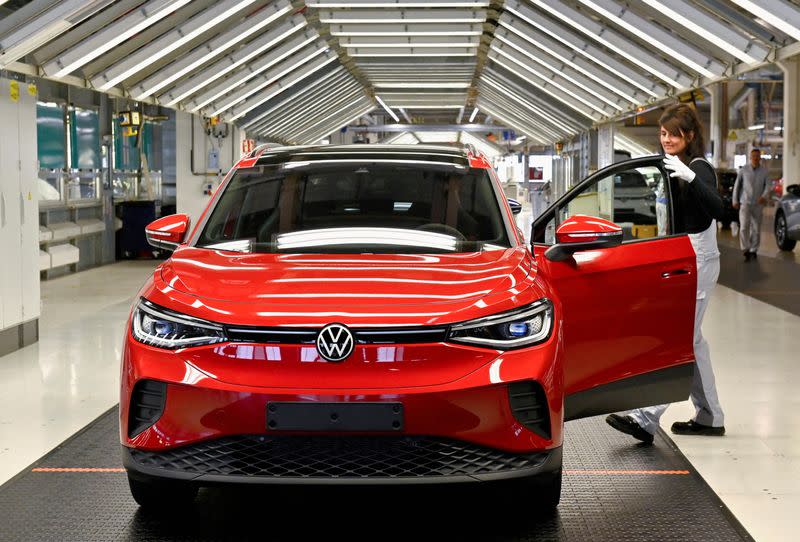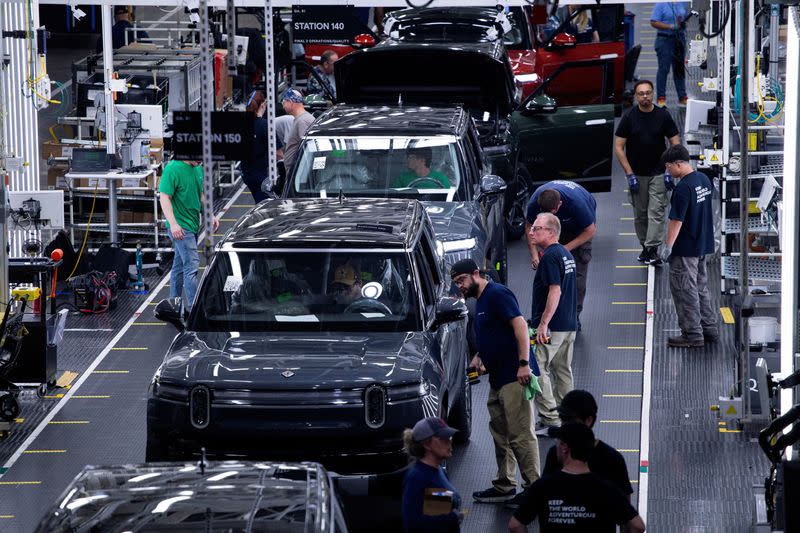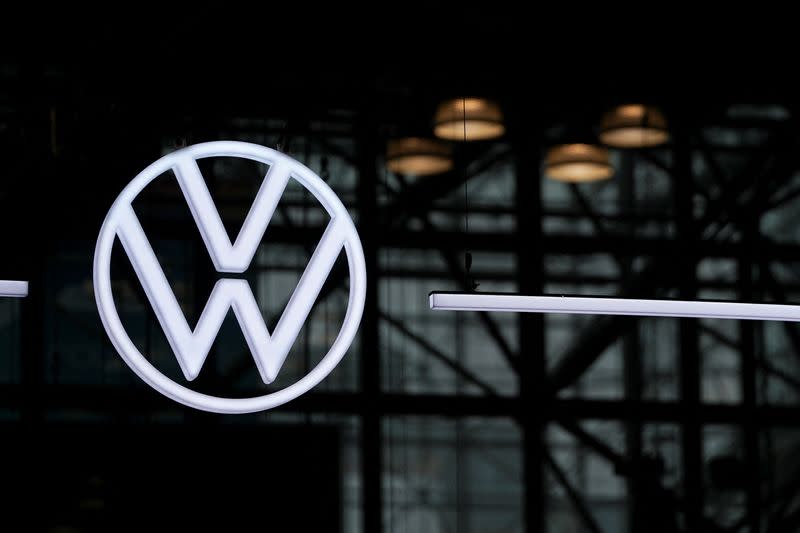Volkswagen stock slips on cost, implications of Rivian JV; Rivian soars
By Victoria Waldersee, Akash Sriram
BERLIN (Reuters) -Volkswagen shares fell 2% on Wednesday as investors worried about the cost and uncertainties of a joint venture with U.S. electric-vehicle maker Rivian aimed at beefing up the biggest European automaker's position in EVs.
Rivian investors cheered the shot in the arm, pushing up the stock of the money-losing company as much as 37%. The shares were up 24.4% at midday in New York, adding nearly $3 billion to its market value.
The German group said on Tuesday it would invest up to $5 billion in Rivian as part of a venture to share EV platforms and software. The investment will also bolster Rivian's depleting cash reserves, move the startup closer to profitability and help it compete better in a market dominated by Tesla.
The tie-up is the latest shift by Volkswagen from a go-it-alone strategy to bringing in expertise via partnerships in key areas for electrification, from batteries to EV platforms to software.
It also underscores the struggle of traditional automakers to build battery-powered vehicles and advanced software even as EV startups grapple with a slowdown in demand amid high interest rates and dwindling cash.
But it adds to questions about the future of Volkswagen's own software subsidiary, Cariad, which has experienced years of delays and losses. Questions also remain about whether the two companies will be able to align culture and strategies.
"Cariad should and will disappear. The reality is it's going to become irrelevant and die a natural death," said Jefferies analyst Philippe Houchois, adding that no other legacy carmaker had managed to build a competitive software offering alone.
Still, Houchois welcomed the change in strategy signalled by the deal. "The old VW would have kept throwing money at the problem - the new VW with (CEO Oliver) Blume is more pragmatic and humble, looking for help elsewhere."
Responsibility and resources for developing a unified operating system for vehicles across the Volkswagen Group - dubbed the "2.0" software architecture or "software-defined vehicle" - will be centralised in the joint venture, bringing in expertise from Cariad.
The JV will be a repository of Rivian's existing intellectual property, and the company's upcoming R2 SUV will be the first vehicle to use software from the venture. Volkswagen vehicles, including its Audi, Porsche, Lamborghini and Bentley brands, will follow.
Cariad will also carry on developing its own projects, including software for automated driving, a Volkswagen spokesperson said.
Cariad CEO Peter Bosch said in a LinkedIn post late on Tuesday that the JV would speed up Volkswagen's software development efforts and lower costs.
The partnership mirrors aspects of a deal struck between Volkswagen and Chinese EV startup Xpeng in July last year to collaborate on software and a China-specific EV platform, though unlike the Xpeng partnership, Rivian and Volkswagen will not develop joint models.
While the software developed with Xpeng is intended for use only in China, that developed with Rivian could technically be used anywhere, the VW spokesperson said, adding the specifics were not yet decided. MORE CAPEX
Rivian has been on a steadier footing than other EV startups - some of whom have gone bankrupt - but it still posts losses of nearly $40,000 for every vehicle it delivers. It has been renegotiating supplier contracts and building some parts in-house to slash costs.
Prior to Wednesday's gains, its shares had lost half of their value this year. Volkswagen shares have more than halved over the past three years.
"Joining forces in this way may also help lower the cost-per-vehicle and bolster defences against the growing might of Chinese EV makers," said Susannah Streeter, head of money and markets at Hargreaves Lansdown.
Some analysts who follow VW raised concerns about the size of the investment.
"While the transaction could make sense strategically ... we believe investors would prefer VW to sell assets, not buy them," Stifel Research said.
Roger Atkins of consultancy Electric Vehicles Outlook also questioned whether Volkswagen and Rivian were compatible.
"There's the culture issue - trying to combine Rivian's full-stack vertically integrated and flexible, nimble software approach with Volkswagen's more traditional approach of working with multiple suppliers and middle management is like shoving a square peg in a round hole," he said.
(Reporting by Victoria Waldersee in Berlin and Akash Sriram in BengaluruAdditional reporting by Christoph Steitz in Frankfurt and Abhirup Roy in San FranciscoEditing by Madeline Chambers, Mark Potter, Sayantani Ghosh and Matthew Lewis)

 Yahoo Finanzen
Yahoo Finanzen 


